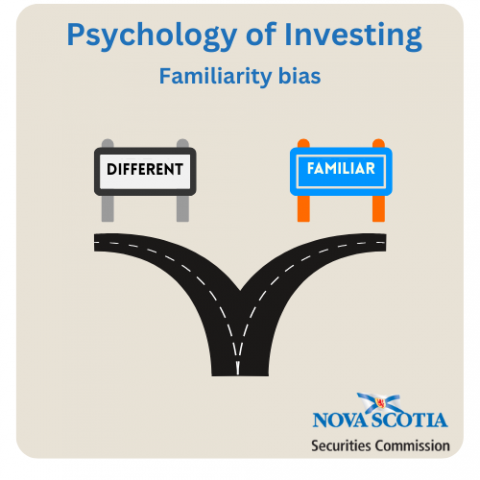Submitted by nsscadmin on

The ninth part of our psychology of investing series takes a closer look at familiarity bias. Do you tend to favour things that are familiar and show less interest in things that are unfamiliar to you? This could be due to familiarity bias. If this bias influences your investing it could cause you to invest only in companies, sectors or asset classes that are familiar to you, which may lead to an undiversified portfolio with higher volatility or risk of losses.
If you’re a DIY investor who manages all or part of your investing portfolio you likely won’t have time to familiarize yourself with all the investment options available to you. If this is the case, familiarity bias can creep into your investment decisions and cause you to gravitate toward investments you are familiar with, often without even thinking about it. For example, you may only invest in types of investments you recognize, companies or industries you are familiar with, or investments that you know other people are investing in already.
Familiarity bias can lead to trouble because it could mean your portfolio isn’t diversified if you only stick to the familiar. It also may result in investments that may not be suitable for you and your financial goals. It is important to be aware of this and to base your investment decisions on objective criteria, not simply on your familiarity with an investment. An undiversified portfolio is also riskier. When an investment portfolio is concentrated your chances of losing a larger portion of your investment will increase. In other words, one asset’s performance in a concentrated portfolio can have an outsized effect on the overall return. A diversified portfolio will include different asset classes, industries, geographic regions, etc.
If familiarity bias has negatively influenced your investment decisions in the past or you believe you are susceptible to familiarity bias, here are a few ways to protect yourself when investing.
Consider different investments – Look into investments you are not familiar with. This could include different investment products, investment types, or investing in different companies or industries. Remember, just because you learn about a different type of investment does not mean you must invest in it.
Consult a registered financial adviser – If you’re worried that biases will keep you from investing in unfamiliar investments, you may want to consult a registered financial adviser to assist you in managing your portfolio. They can talk to you about and introduce you to different types of investments that should be suitable for you. It will still be up to you to decide whether or not to invest.
Our series on the psychology of investing concludes in two weeks with Part 10 which looks at connections between bias and fraud.
